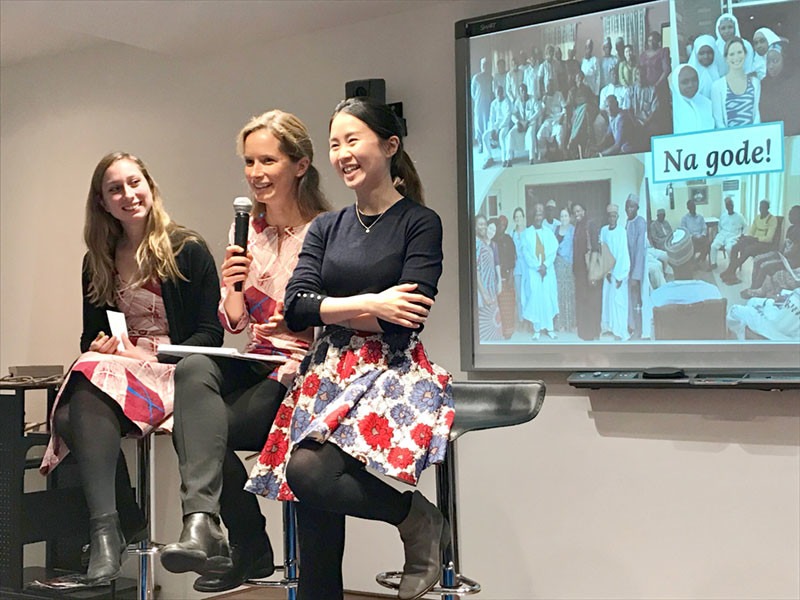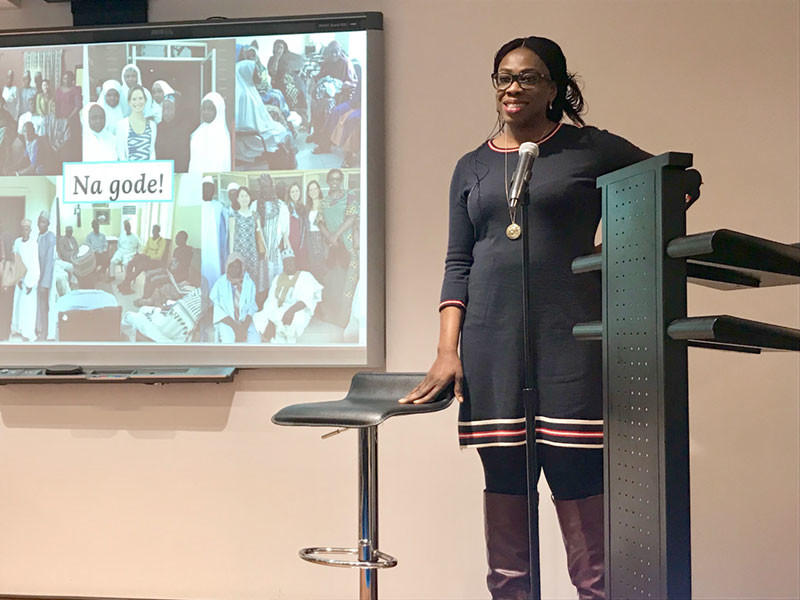Educadoras que trabalham em centros de aprendizagem não formais no nordeste da Nigéria são mais motivados do que os homens para ensinar aos alunos em risco a partir de uma sensação de ser modelos, Embora as mulheres sejam mais frequentemente desencorajadas do ensino por causa das pressões familiares, Um novo estudo encontrado.
Pesquisadores do As mulheres sais lideram Programa de Practicum e Escola Universitária Americana da Nigéria (Aun) descobri que 100 Porcentagem de mulheres achava que ser um modelo era sua principal motivação, comparado com 88.7 porcentagem de homens, para o trabalho deles como facilitadores de aprendizagem. A Creative Associates International fez uma parceria com as duas universidades no projeto.
Infelizmente, aproximadamente 30 Porcentagem das mulheres foi desencorajada do ensino por suas famílias ou comunidades, em comparação com apenas 8.3 porcentagem de homens.
Estes são dois da chave Resultados da pesquisa Lançado em abril 17 Durante uma apresentação de Sais e Aun, chamado "Habilitando e capacitando os facilitadores do aprendizado feminino no nordeste da Nigéria".
Facilitadores de aprendizagem são adultos que foram selecionados pelas comunidades para educar as crianças, particularmente estudantes em risco, como nigerianos deslocados internamente. Durante cinco dias de treinamento intenso, Os facilitadores são ensinados a criar um ambiente de aprendizado amigável e acolhedor para as crianças muitas vezes traumatizadas, incorporando atividades em grupo e recreação, uma ruptura com os ambientes de aula geralmente mais formais da maioria das salas de aula nigerianas.
Os facilitadores aprendem técnicas que criam um ambiente centrado no aluno, em vez de depender de palestras, notas no quadro-negro e memorização.
Três pesquisadores da SAIS Georgia Jewett, Emily Weiss e fechou Yow focou em examinar a educação das meninas, analisando especificamente como aumentar o impacto durante o curto- e a longo prazo, avaliando as barreiras à entrada que as mulheres enfrentam para se tornarem educadores. Eles também desenvolveram recomendações sobre como superar essas barreiras para o criativo replicar em uma escala maior.
Com o objetivo de identificar abordagens eficazes para garantir a inclusão de mulheres na sala de aula, A equipe de estudantes de pós-graduação da SAIS trabalhou em estreita colaboração com o Creative and Aun em um projeto de pesquisa de nove meses. A pesquisa foi liderada por Kent Davis-Packard, Doutorado., O coordenador líder das mulheres da SAIS e professor adjunto de estudos do Oriente Médio e teoria global e história.

Recrutamento e recursos: dois elementos -chave
Ao apresentar suas descobertas na Creative, Os pesquisadores da SAIS destacaram que garantir a educação de qualidade no nordeste da Nigéria é um desafio significativo. Os recursos estão espalhados mais finos e os facilitadores e professores de aprendizado não estão adequadamente equipados para lidar com a crise de aprendizado - especialmente para educadores femininas.
Ao recrutar facilitadores de aprendizado ou professores no país, Candidatas qualificadas são muitas vezes muito pequenas. A retenção de professores é a Nigéria está repleta de barreiras de acesso. Normas culturais, casamento precoce, má infraestrutura, Falta de transporte e resistência dos colegas do sexo masculino mantêm as educadoras fora do sistema educacional, disseram os pesquisadores.
Ao discutir intervenções específicas para preencher a lacuna de gênero, Emily Weiss, Um dos estudantes de pós -graduação, disse, “Enquanto os projetos educacionais existentes dependem efetivamente de iniciativas comunitárias de baixo para cima para recrutar professores, Mulheres rurais geralmente não têm acesso a redes profissionais e sociais. Como resultado, Eles perdem oportunidades importantes para se conectar com os recrutadores. ”
Para resolver este gargalo, Os três pesquisadores sugeriram descentralizar o processo de recrutamento e empregar mais mulheres em unidades de recrutamento para identificar melhor as candidatas qualificadas com uma participação pessoal na melhoria do acesso à educação para meninas em sua comunidade.
Junto com a descentralização do processo de recrutamento, Os pesquisadores recomendaram o estabelecimento de relacionamentos com faculdades locais, Promovendo mulheres em posições de liderança e redes de apoio a pares, e aumentar a segurança escolar como abordagens para garantir a participação das mulheres na educação.
Apesar da variedade de desafios, Os pesquisadores descobriram que "ser facilitador de aprendizado feminino deu às mulheres um senso de propósito" e a abordagem não formal de aprendizado do Creative estava tendo resultados positivos em comunidades. Eles observaram que as atitudes culturais estão mudando para as mulheres que trabalham fora de casa.
"Há muito otimismo de homens e mulheres em torno de mais mulheres na Nigéria entrando na força de trabalho para contribuir com a renda familiar e aumentar o crescimento econômico do país,- disse Weiss.
Os pesquisadores observaram que a programação existente do Creative aumentou a participação do facilitador de aprendizado feminino, particularmente em áreas rurais, e pode continuar a ativar e capacitar as mulheres na Nigéria com análise contínua e intervenções baseadas em evidências.
Pesquisas e entrevistas fornecem detalhes
Para abordar essa diferença de gênero no nordeste da Nigéria, Os pesquisadores da SAIS e da AUN viajaram para o nordeste da Nigéria em janeiro 2018 Para reunir dados qualitativos e quantitativos sobre as barreiras e incentivos, as facilitadoras de aprendizado feminino enfrentam o dia-a-dia.
Liderado por Professor eu pergunto a Nwankor, Associado de pesquisa visitante e professor adjunto de estudos africanos em SAIS e consultor dos estudantes de pós -graduação na Nigéria, a equipe pesquisada 114 professores, discussões de grupo focal de LED com sobre 147 participantes, e conduzido 24 Entrevistas com informantes-chave com líderes tradicionais e religiosos, Oficiais do governo e especialistas em educação.
Nwankwor disse que, ao incluir os alunos da AUN local nas atividades de coleta de dados, A capacidade local cresceu e aumentou as chances de sucesso programático e sustentabilidade. Os estudantes nigerianos foram capazes de desenvolver habilidades práticas de pesquisa, incluindo rigorosas técnicas de entrevistas e métodos analíticos de dados.
Ponte a lacuna educacional
Do 57 milhões de crianças fora da escola no mundo, mais do que 10.5 milhão deles estão na Nigéria. No nordeste da Nigéria, A taxa de presença no nível primário é 43 porcentagem para meninas e 46 porcentagem para meninos. Comparativamente, 85 porcentagem de meninas e meninos frequentar a escola igualmente na região sul do país.
Com base na disparidade da educação nas duas regiões, a pesquisa focada no USAID-financiado e implementado de forma criativa Resposta à crise educacional e Iniciativa de Educação do Norte Plus Projeto nos estados nigerianos de Adamawa e Bauchi. Esses programas fazem parte da experiência da Creative em educação em conflito.
O Resultados da pesquisa ajudará a moldar as abordagens eficazes do programa e ajudar a combater a divisão de gênero da Nigéria. Fora de 144 países, A Nigéria é classificada 122 Ao abordar as disparidades baseadas em gênero em quatro áreas principais: saúde, educação, economia e política, de acordo com o Relatório Global de Gap Gap por Fórum Econômico Mundial.

Durante a apresentação da pesquisa, Prosscesoror está do lado do lado do fim., “Mulheres e questões de gênero não devem ser colocados por último. Na virada do século, Nossa esperança é que a igualdade de gênero seja normalizada na Nigéria e em todo o mundo. ”
Juntando -se à discussão, Charito Kruvant, Fundador e presidente do conselho da Creative, disse, “Para abordar as questões globais mais complexas, como a desigualdade de gênero, É fundamental colaborar com instituições acadêmicas que tenham as ferramentas e o conhecimento para ter mais impacto. ”
A importância do aprendizado emocional social
Os pesquisadores destacaram o benefício de incluir Aprendizagem sócio-emocional no currículo educacional, especialmente em ambientes de emergência. Os entrevistados disseram que era "muito importante" ter treinamento de aprendizado emocional social para abordar assuntos sensíveis como a igualdade de gênero, trauma sexual e higiene feminina com estudantes.
Os resultados da pesquisa também apontaram para o impacto positivo de estabelecer Coalizões comunitárias Para se envolver com os residentes. O projeto fez esforços deliberados para incluir mulheres nas coalizões comunitárias, especialmente em posições de liderança, e dar a eles a chance de contribuir para a tomada de decisão em suas comunidades.
Em sua apresentação na Creative, Os pesquisadores da SAIS examinaram uma série de abordagens para apoiar as mulheres profissionalmente, economicamente e socialmente, refinando modelos de programas de educação.